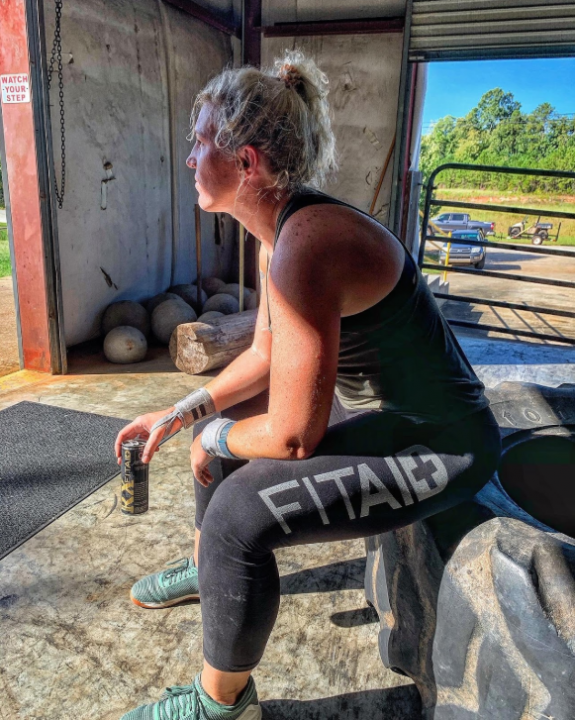Photo courtesy of cnn.com
As a mama of twin one year olds, a business owner, and a fitness lover, adequate sleep is an absolute CRITICAL component in my routine. But easier said than done, right? With two teething kiddos, late nights getting caught up on work, and just trying to fit all my daily “to do’s” in before bed, I have often caught my sleep taking a major hit.
The last handful of months I have shifted my focus to creating a pre-bed routine that will support the best sleep possible, even if it is for less hours than this mama would like!
Whether you’re a parent of littles yourself, or just simply need some better sleep hygiene, I encourage you to try some of the suggestions in this list and see what they can do for you and your sleep + recovery!
- Get outside during daylight hours.
Especially this last year - so many of us have spent more time indoors than ever. Getting outside and into the sunshine helps your body keep its circadian rhythm in check. Bonus points if this outdoor time involves physical activity! Which leads me to my next point…
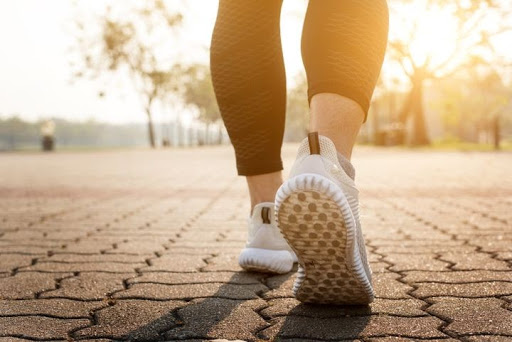
Photo courtesy of huffpost.com
2. Get a workout in!
I am sure I am preaching to the choir with this one, but getting in physical exercise during the day helps improve sleep and reduces symptoms of insomnia. Just make sure you get your workout in at a time that supports your sleep schedule - for some, working out too late in the day may make sleep more difficult, as exercise stimulates the body.
3. Create a consistent routine
Parents of little ones know that creating a consistent bedtime routine helps their kids get to sleep faster and easier. This is true for adults too! Start a pre-bedtime routine to signal to your brain that it’s time to wind down for the day. This can include numerous things, but here is what my personal routine includes!
- Having a consistent bed time / wake time (yes, even on weekends!).
- Turn TV / bright lights off an hour before bed.
- No liquids (with the exception of #5, which I will get to in a minute) within 2 hours of bed.
- Write out a To-Do List for the next day, so it’s not circling around in my head as I try to fall asleep.
- Lay out workout clothes for the following morning.
- Take a hot shower.
- Do my skincare routine, brush teeth.
- Read for 10-20 minutes.
- Set thermostat to cool, completely black out the room, and turn on sound machine.
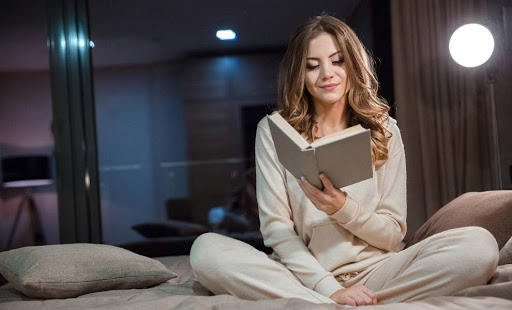
Photo courtesy of johnryanbydesign.co.uk
4. Block out blue light in the evening.
Y’all knew this one was coming. Blue light loves to ruin our sleep. Much to my first point - our brains have a natural clock that is based off of light/darkness. Blue light throws our circadian rhythm for a loop, and too much exposure before bed time can trick your brain into thinking it is “awake time”.
I know firsthand how difficult it is to cut out ALL blue light in the evenings (this is my chance to catch up on work after the kids have gone to bed - and work includes phones and a computer!), BUT there are things you can do to help. Wearing blue light glasses, installing apps that block blue light on your phone/computer, etc are great ways to lessen the impact of blue light in the evenings.
5. Use a sleep aiding supplement - like DREAMAID GO!
I started using the new DREAMAID GO packets as soon as they were released, and I have been hooked ever since. I have consistently been falling asleep faster, staying asleep, and just overall getting better sleep (proven by my FitBit sleep scores each morning!), and I couldn’t be happier with these results. I have been getting my first EVER “90”s with my FitBit sleep score, and I know that is no coincidence.
Best of all, it tastes great and I actually look forward to drinking it. I drink it about 30 minutes before bed (once I am done with my shower) and usually mix it with about 4oz warm water, although it is great cold too! It tastes like an herby orange tea - so delicious!

What other sleep suggestions would you add to this list? What works personally for you? I’d love for you to share in the comments below!
- Molly Tilove @mollyeledge
Sleep is on our minds and we wanted answers to all of our burning questions about getting a restful night’s sleep. We sat down with US Army Neuroscientist and US Army Warrior Fit athlete Dr. Allison Brager to learn more about sleep and how to get more efficient with our sleep game. Here’s what she had to say.
What is the most common sleep challenge?
The most common sleep challenge is developing a consistent, sleep-promoting routine. Sleep is directly tied to our behavior and actions. If we prepare our brains for sleep (winding down/putting away phones/not watching Netflix, etc.) at least an hour before bedtime, we put ourselves in the best position possible to enter the deepest & most restorative stages of sleep. It takes commitment & discipline but the benefits of restorative sleep on next-day performance is worth every bit of the sacrifice.
What are some vitamins/herbs/supplements that can support sleep?
Herbal remedies/supplements for sleep have been around for centuries. The ancient Chinese have been reported to use valerian root. A recent supplement promoting restorative sleep of interest is magnesium due to its mediation in how the central nervous system communicates. Tart cherry root (a natural source of melatonin) has also been shown to promote sleep in one clinical study. More research needs to be done on the benefits of select herbs/supplements on actual sleep processes but there are challenges due to the fact that the supplement industry is not regulated by the FDA. However, we shall prevail and it is industry leaders like LIFEAID who can implement a change in bureaucracy.
Why is your circadian rhythm so important?
The circadian rhythm is literally everything. The master circadian clock in the brain has input and output from virtually every tissue in the body. There is a self-sustaining circadian clock in every tissue of the body. When I was a fellow, I discovered one of these clocks in the skeletal muscle and how it regulates sleep (Ehlen, Brager et al. 2017). Because of these unique biological pathways, this is why adhering to a strict sleep routine, training, and even eating schedule are so incredibly important. A change in routine can rapidly shift the clock and how we sleep & perform.
What’s the difference between REM and Non-REM Sleep?
NREM sleep is for physical recovery & REM sleep for cognitive recovery, but both are equally as important and make up what is known as deep & restorative sleep. We cycle through NREM-REM in 90 min cycles across the night. The 90 min cycle is more saturated with NREM sleep in the first half of the night and more REM sleep in the second half of night. This distribution is actually tied to the circadian rhythm of core body temperature.
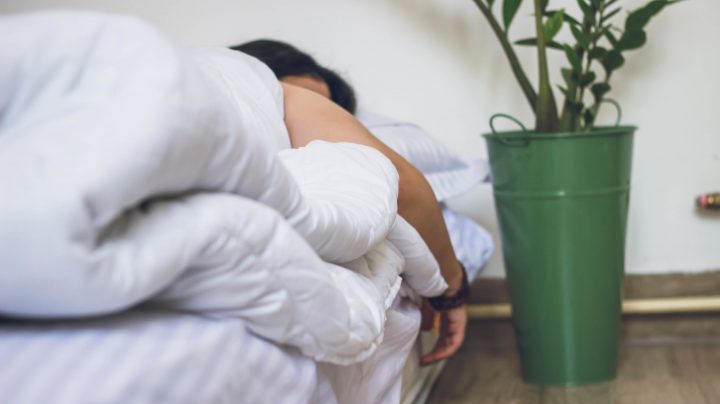
What is the best sleep environment?
The best sleep environment is dark (pitch black!), cool (< 68 degrees F), and noise free (with the exception of a white noise machine which research supports to help coax the brain into sleep). It's that simple. This one percent change goes a long way.
Is there such thing as too much sleep?
From the perspective of someone who is in a career field known for massive sleep deprivation/sleep debt (i.e., first responder & military), no. Sleep banking prior to bouts of sleep deprivation can actually help stabilize performance during bouts of sleep deprivation. For the average person though, too much sleep can be a sign of an underlying health condition. But the important point here is that we never ever want to be in any situation where we are accumulating sleep debt.
Can daytime naps affect sleep?
Napping is a wonderful thing. Napping can help to repay sleep debt. Napping can also lead to an immediate benefit/boost in cognitive & athletic performance. Nap timing and amount matters. Keeping a nap < 30 min in the afternoon ensures that it will not disrupt sleep at night.
Is it better to sleep on your back, stomach or side?
Sleeping position absolutely matters. Sleeping in the fetal position is absolutely best. Sleeping on one's back can make one more prone to sleep apnea-like episodes (due to relaxing of the tongue/throat muscles) and sleeping on one's stomach requires more effort to breath (due to dead weight). There are now forming pillows (i.e., Rooster Recovery) available to ensure one sleeps on their side.
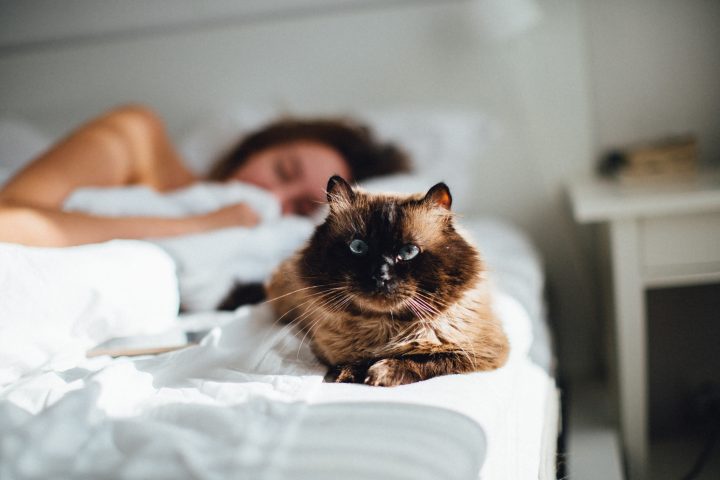
How does food affect your sleep quality?
This is challenging for athletes but one should avoid food high on the glycemic index prior to bed (e.g., bananas, candy). A higher glycemic index can spike blood glucose preventing one from entering the deepest stages of restorative sleep.
When should you workout for the best night’s sleep?
Exercise elevates core body temperature. Lower core body temperatures lead to hitting the deepest & more restorative stages of sleep. As such, aim to finish working out 2 -3 hours before bedtime to allow core body temperature to return to baseline. This of course applies to high-intensity exercise. Taking a walking or moderate exercise (< 40% rate of perceived full exertion) to relax & wind before bed won't have the same impact.
Why do we dream?
Dreaming is part of REM sleep. It happens due to high activation of the visual cortex & hippocampus (center of memories) among other brain areas. REM sleep can be best described as an awake brain in a paralyzed body. REM sleep helps to consolidate learned information for future recall.
Why can we remember some of our dreams and forget others?
This largely has to do with where one wakes up in the sleep cycle. The 90 min sleep cycle goes from NREM-REM-wake (very briefly). One is more likely to remember their dream if they wake up (and stay awake for a brief time) after fully completing a NREM-REM sleep cycle. This is why we tend to remember our last dream before we fully wake up in the morning.
Why do we sleep talk/walk?
Sleep talking and walking happen during NREM sleep not REM sleep. It is a myth that it happens during REM sleep. Basically, the brain gets a mixed signal to "move" when it shouldn't and that is why people who sleep talk & walk engage in automatic behaviors like talking & walking. Sleep talking & walking are not healthy and a sign for sleep deprivation or something more clinically concerning.
What do different sleep positions say about you?
Hahah, I'm not sure but the fetal position is best! And also, being the big spoon and/or little spoon may release other "feel good" chemicals of love & attachment like oxytocin and vasopressin.
What questions do YOU have about sleep? Let us know in the comments!
Now more than ever, we all need simple ways to unplug and escape the stress of daily life.
Here are our top tips for creating more zen moments while at home:
♦ JOURNAL:
The act of writing your thoughts down on paper can be very therapeutic, freeing your mind from carrying all those things around. Challenge yourself to also write down something you’re grateful for each day. Positive, calm thoughts will help frame your daily words & actions.
♦ SLEEP:
A lot of people are having trouble sleeping right now, causing our minds, bodies & immune systems to suffer. Getting daily exercise, unplugging before bedtime and creating a calm sleeping environment (try adding lavender to your oil diffuser) have been shown helpful for obtaining 6-8 hours of quality rest each night.
♦ MEDITATE:
Starting a daily habit of meditation can help decrease stress. If you’re finding getting started difficult, set a timer for two minutes, count your breaths and don’t get caught up in whether you’re doing it ‘right’. Simply allow yourself to slow down & focus on your body, any feelings that arise, and release stressful thoughts before smiling and continuing with your day.
♦ UNPLUG:
Set aside ‘screen-free’ times during the day to help give your mind & eyes a break (from texts, social media, work or other online distractions). Don’t bring your phone into the bedroom—morning or night, your mind will benefit from escaping the unnecessary stress a phone screen can bring to start and end your days.
♦ DIET:
What you put into your body is key, especially during times of elevated stress. Eating whole foods, drinking plenty of water, getting your daily vitamins and natural remedies like hemp can help balance the nutrients your body needs daily to feel calmer. Click here to learn more about LIFEAID HEMP Balance Blend.
C O N C L U S I O N
Life's stressful enough right now. Hopefully these tips will be helpful reminders for you to take moments during your day to pause, breathe more deeply and appreciate the good things in your life. We all could use more moments of zen. Be well, everyone.
> > > Stay well.
You’ve got a competition coming up and you’re deeply invested in your meal prepping, training schedule and water intake but you’ve also got some intense travel sessions booked. You have all the best intentions of keeping to your training schedule but a few hours of waiting around in the airport and some questionable airplane food later, you’re wondering whether you really want to make the leap to your phone to call a ride. It happens to all of us!
Next time you’re on the move, take these tips with you to help you out along the way.
Think of it as your nagging gym friend who keeps telling you to go to the 9am Saturday WOD.
Recovery Is Key
Focusing on your range of movement exercises and recovery stretches can help out big time after being jammed into a small airplane seat all day. While you’re waiting for your flight, take some time to stretch it out. It’ll help you feel less beat up and slightly more rejuvenated and get you ready for your next flight. There are several apps on the market these days that can run through some movements ranging anywhere from a 10-minute stretch to a full-on 45-minute yoga session. You might get some looks but you’ll be the one feeling good!
Pack It Out
Be prepared for any sort of food situation by bringing in your own meal preps and snacks. This can be especially helpful if you’re on a long car ride or in a town where you don’t know or have access to a grocery store. Bringing a cooler full of your favorite training foods and drinks loaded with turmeric and BCAAs can help out with your recovery as well as just make you feel good after hours in the car. A lot of Airbnbs will let you use their kitchen, so bringing your own ingredients can definitely help out when you’ve just gotten into town and you’re ready to tuck into a heaping meal.
 (Image courtesy of: Anna Kirkpatrick)
(Image courtesy of: Anna Kirkpatrick)
Pre-Commit to Training
Something I like to do before I travel is research a local CrossFit box and send them an email letting them know I’d like to drop in on a certain day and time. Finding somewhere you’d like to train beforehand helps you to take the guesswork out of the where and gives you a why! Why are you going? Because you’ve already contacted the coach and committed to going! Also, training at a different box is pretty exciting.
Focus on Sleep
This definitely goes without saying but sleeping is important in recovery and general wellness. If you’re traveling to a different time zone, try getting on that schedule as soon as possible. Eat meals when you’re supposed to eat (even if that means you have two dinners) and sleep when you’re supposed to sleep. That’ll help your body align with your new time. The temptation is to sleep until the afternoon or to crash as soon as you open the door to your hotel, but resist the urge! You’ll be glad you did.
CONCLUSION
Traveling is one of life’s greatest pleasures so don't be afraid to live in the moment! There is something in being prepared but also in not being too rigid. Try to do what is best for you and your health in that moment. Always remember that, above all else, it’s about doing what makes you happy.
Image courtesy of: @the_goodish_traveler
(Cover image courtesy of: Robert Smith)
About the Author:
Georgia native Tiffany Ammerman is the thru-hiker and CrossFitter behind the travel blog The Goodish Traveler. She spends the majority of her time traveling, eating sushi and searching for hiking trails. When she's not blogging, Ammerman can be found training at CrossFit LaGrange and teaching art to kids.
> > > Live well.
